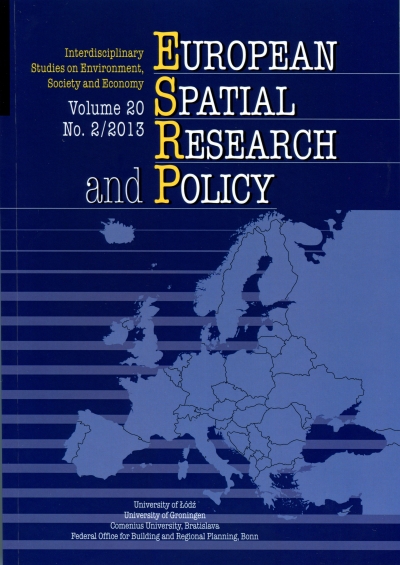The Model’s Limitations. What ‘Urban Sustainability’ for Port-au-Prince? European Urban Projects Put to the Test by the Haitian City
DOI:
https://doi.org/10.2478/esrp-2013-0010Keywords:
Port-au-Prince, Haiti, urban sustainability, state, NGO, governance, emergency, development, model, European UnionAbstract
In 2010, the capital of Haiti was devastated by an earthquake that seemed to provide the opportunity for the country, as well as foreign donors, to put Port-au-Prince on the track of an ordered, planned urban policy, in line with its multi-risk context. Prior to the earthquake, the lack of a legal framework for urban planning was called into question. In its wake, speeches making the capital the emblem of a new ‘sustainable’ start have flourished. The European Union, the main donor of funds for Haiti, has embarked on a programme of support for reconstruction, but with what results three years later? The paper proposes to approach the limitations of the ‘sustainable city’ model, conditioned by spatiotemporal continuity. The systemic functioning underlying urban sustainability clashes with the context of Port-au-Prince, where spatial division and temporal discontinuity are determinant. In spite of itself, aid and its operation by projects, seems to enforce urban fragmentation and dissonance.
Downloads
References
ALLIX, G. (2010), ‘It Will Be up to the Citiznes to Decide the Future of Port-au-Prince’, Interview, Le Monde, 25th February.
Google Scholar
Anglade, G. (2008), L’hebdo de Georges Anglade. Chronique d’une espérance, Port-au-Prince: L’Imprimeur II.
Google Scholar
Barthel , P.-A. (2011), ‘Premiers quartiers urbains “durables” dans les pays arabes: enseignements sur une génération spontanée’, Espaces et sociétés, 147, pp. 99–115.
Google Scholar
Bathélémy, G. (1990), L’univers rural haïtien: le pays en dehors, Paris: L’Harmattan.
Google Scholar
Cabanis, M. (1996), ‘Un exemple de créolisation juridique modulée: le Code civil haïtien de 1825 et le Code Napoléon’, Revue Internationale de Droit Comparé, 48 (2), pp. 443–456.
Google Scholar
CAROIT, J.-M. (2012), ‘A Haïti, la reconstruction avance “à pas de tortue”’, Le Monde, 11th January.
Google Scholar
Chaveau , J.-P. and Le Meur, P.-Y. (eds.), (2004), ‘Gouverner les hommes et les ressources. Dynamiques de la frontière interne’, Autrepart, 30, pp. 3–150.
Google Scholar
Chesneaux, J. (2001), ‘Mémoire et projet urbain’, [in:] Paquot, T. (ed.), Le Quotidien urbain, Paris: La Découverte, pp. 107–127.
Google Scholar
Choplin, A. (2012), ‘Désoccidentaliser la pensée urbaine’, Métropolitiques, 2nd November, http://www.metropolitiques.eu/Desoccidentaliser-la-pensee.html
Google Scholar
CIAT (2010), Haïti demain. Objectifs et stratégies territoriales pour la reconstruction, Port- au-Prince: Comité Interministériel d’Aménagement du Territoire.
Google Scholar
Comaroff, J. and Comaroff, J. (2011), Theory from the South: Or, How Euro-America Is Evolving Toward Africa, Boulder: Paradigm.
Google Scholar
COMITÉ TECHNIQUE FONCIER ET DÉVELOPPEMENT (2009), Gouvernance foncière et sécurisation des droits dans les pays du Sud. Livre blanc des acteurs français de la coopération, Paris: GRET, http://www.diplomatie.gouv.fr/fr/IMG/pdf/gouvernance-fonciere-et-securisation-des-droits-dans-les-pays-du-sud-livre-blanc-des-acteurs-francais-de-la-cooperation.pdf
Google Scholar
Dorner, V. and Oriol, M. (2009), ‘L’indivision en Haïti. Droit, arrangements sociaux et agriculture’, communication présentée lors des 3es journées de recherches en sciences sociales INRA-SFER-CIRAD, session Les droits sur la terre: catégories juridiques, représentations et temporalité, Montpellier, 9th-11th December.
Google Scholar
FEEDBACK REPORT (2012), CONT Delegation Visit to Haiti, 22th–26th February, unpublished.
Google Scholar
FIDH (2010), ‘Haïti: une nation ébranlée’, May.
Google Scholar
HAITI LIBRE (2011), ‘Haïti – Reconstruction: 3,3 milliards pour un Nouveau Port-au-Prince!’, 11th August.
Google Scholar
HAITI PDNA (2010), Haïti – PDNA du tremblement de terre. Évaluation des dommages, des pertes et des besoins généraux et sectoriels. Annexe du Plan d’action pour le relèvement et le développement national d’Haïti, Port-au-Prince: Gouvernement de la République d’Haïti.
Google Scholar
HOU (2011), ‘Haïti et les crises’, Document de travail.
Google Scholar
IHSI (2010), Les comptes économiques en 2009, Port-au-Prince: IHSI, http://www.ihsi.ht/
Google Scholar
KI-MOON, B. (2010), ‘Vers un nouvel avenir pour Haïti’, LEMONDE.FR, 31st March.
Google Scholar
LAHENS, Y. (2011), ‘Il était une fois une ville’, Conjonction, 223.
Google Scholar
LE PÉLICAN (2010), ‘Bay Kout Men Haïti a commencé la construction d’une école’, 23rd July.
Google Scholar
Little, S. (2003), ‘Globalisation, Europeanisation and Metagovernance: Society, Space and Technology’, European Spatial Research and Policy, 10 (2), pp. 9–24.
Google Scholar
Manigat , S. (2011), ‘Le séisme et quelques questions relatives à la gouvernance’, Conjonction, 223, pp. 57–62.
Google Scholar
Martel , A. (2012), ‘La coordination humanitaire comme lieu d’exclusion et d’affaiblissement des capacités locales’, Lettre de l’Observatoire Haïti, 1, pp. 3–7.
Google Scholar
MATHURIN, A. (1976), Bi-centenaire de la fondation de Port-au-Prince: 1749–1949. Exposition Internationale, Port-au-Prince: Imprimerie.
Google Scholar
Miller, M. J. (2002), ‘Le “quartier” comme enjeu social et politique: Alma-Gare dans les années 1970’, Genèses, 48, pp. 77–99, www.cairn.info/revue-geneses-2002-3-page-77.htm.
Google Scholar
NOEL, R. (2012), ‘Deux thématiques fondamentales et indissociables dans la carde de la reconstruction da la ville de Port-au-Prince’, Lettre de l'Observatoire Haïti, 2, pp. 3–5.
Google Scholar
Paul, B., Dameus, A. and Garrabe, M. (2011), ‘Le processus de tertiarisation de l’économie haïtienne’, Étudesns Caribéennes, 16, http://etudescaribeennes.revues.org/4728
Google Scholar
PETERS, D. (2005), ‘How Different spatial contexts result in Different Sustainability Discourses. A Case Study of North East England’, European Spatial Research and Policy, 12 (1), pp. 69–88.
Google Scholar
Pierre Etienne, S. (1997), Haïti: l’invasion des ONG, Montréal: CIDIHCA.
Google Scholar
Pierre Louis, P. (2002), ‘Le système juridique haïtien: entre ordre étatique et ordre coutumier’, Sistemas Judiciales, 4, pp. 104–110.
Google Scholar
PRESS RELEASE (2012), ‘The European Union Announces New Support for Reconstruction in Haïti – (11.01.2012), http://eeas.europa.eu/delegations/haiti/press_corner/all_news/news/2012/2012_01_11_2_fr.htm
Google Scholar
Redon, M. (2010), ‘Mobilis in mobili: des vies “en mobilité” au Sud: les “expats” de l’humanitaire au Timor-Leste et en Haïti’, Espace, Populations, Sociétés, 2-3, http://eps.revues.org/index4098.html
Google Scholar
Verna, G. (2007), ‘Le comportement des ONG engagées dans l’aide humanitaire: selon leur culture d’origine et les pressions politiques subies’, Anthropologie et Sociétés, 31 (2), p. 25–44.
Google Scholar
Vittrup, E. (2010), ‘Haïti - Reconstruction: Les problèmes fonciers entravent la reconstruction’, Interview, Haiti Libre.
Google Scholar
WORLD BANK (WB), (2013), http://donnees.banquemondiale.org/indicateur/NY.GDP.PCAP.CD
Google Scholar
Downloads
Published
How to Cite
Issue
Section
License

This work is licensed under a Creative Commons Attribution-NonCommercial-NoDerivatives 4.0 International License.














